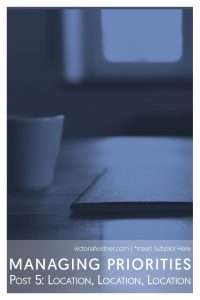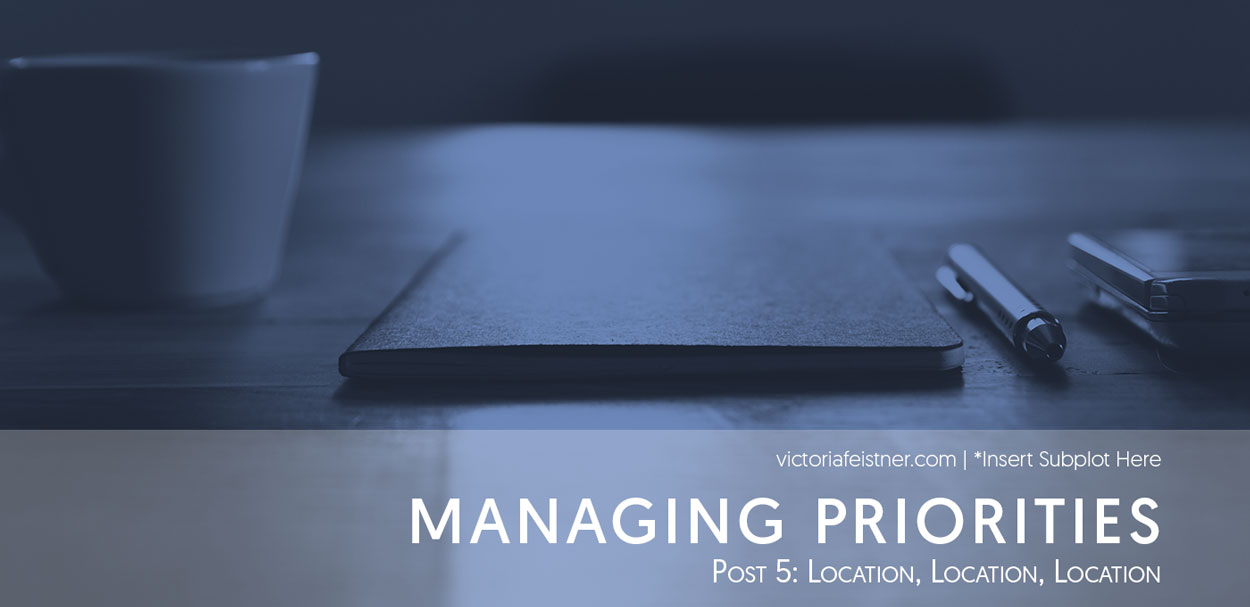This is Part 5 of the Managing Priorities Series. The other parts can be found here: #1, #2, #3, #4,
 We’ve covered the what, when, why/how of being your own project manager. So this just leaves, yep, the where.
We’ve covered the what, when, why/how of being your own project manager. So this just leaves, yep, the where.
Something I’ve noticed a lot being a freelancer is the differences in where people choose to work. One place crammed too many people into an open-concept office that was great fun for the extroverted employees who liked shouting across the room at each other; you could tell the introverts instantly because we were the ones wearing giant headphones, our shoulders up around our ears, trying desperately to maintain the illusion that we were alone so that we could focus. (And yet, while I type this, I’m across a table from a friend and I’m using the fact that he has his headphones on as a visual reminder to get back to work. He is probably doing the same thing.) I’ve worked in cube farms that were blissfully quiet—and then had conversations with colleagues about how frustrated they feel being cut off from each other and feeling like they have to whisper.
My cutie likes to work in bright coffee shops; I like to work in dimly-lit libraries.
Everyone is different, is my point, and there is no one-size-fits-all solution for creating the perfect workspace. Except for the starting point, which is, as you might have guessed if you’ve read the rest of the series: writing it down. Do you work better in a dedicated writing area? With music or with silence? Around people in a busy coffee shop? There’s no way to know until you try a few scenarios, and compare results; and account for naturally low or high days.
If you’re the sort of person who works best in a cafe, congrats! You likely have one near at hand and are already happy with the arrangement. You can skip ahead to point #3 if you want.
For those of you who work best in quiet homey environments and yet still find it hard to focus because something’s just… not… right… Pull up your chair, and together we’ll cover some basics.
1. Cordon Off The Area
Do you have a dedicated desk, or even an office? And yet is it, like, the worst place to get anything done? Is it because it’s a jumble of papers from last years taxes, books you haven’t put away yet, and laundry you intend to fold?
Welcome to the river bend. (I like to call such spaces ‘river bends’ because they naturally collect detritus.)
It’s usually the problem with a perfectly functional home office that doesn’t get used as often as it should: it’s a dumping ground for anything that doesn’t ‘have a home’. There’s papers everywhere or clothes that you meant to donate or a half-finished project that’s not ‘done enough’ to put away. It builds up without much awareness and then when you want to get crackin’ you first have to waste precious energy/decision power on tidying the space. Even if you start on your work, the first time you reach a procrastination point—after a pomodoro, say—there’s something else resting nearby that demands attention. Before you know it you’ve spent the time cleaning and not doing the task you meant to do. Does this sound familiar?
There is no easy hack to solve the problem. First you need to clean the space and empty it entirely of anything that is not work-related: craft projects, books, art supplies, miscellaneous clutter that doesn’t have a home anywhere else. Your office space—whether it’s a room of one’s own or a tiny desk in the corner of your bachelor apartment—needs to be dedicated just to your work. Nothing else. For now don’t even put art; work supplies only. Nothing else. Then it needs to have the door closed on it. Or if it’s part of another room, there needs to be a demarcation line. Perhaps a folding screen; perhaps you drape a sheet over the desk and chair. Be creative if you like but don’t spend a lot of time overthinking. It’s less about the space itself than training your brain (and others sharing the room) not to think of it as ‘the miscellaneous storage/work area’ but as Your Work Zone.
Eventually the solution will reformat some mental pathways, which will a) keep the space from filling with clutter again and b) help you stay focused when you have your butt in the chair, but until that happens, be ruthless. Show no ruth at all.
Work there or don’t be in the space.
That way, when you are ready to start, the space is available with just the opening of a door or the unfurling of a sheet; no preliminary tasks to steal focus or decision power.
Once you’ve established the area as The Place Where Only Work Happens you can go ahead and add back in personal touches like plants or action figures or art to stare at while you’re thinking. It doesn’t need to be sterile. It just needs to be professional, even if it’s in a corner of the basement rec room.
2. I Can’t Hear You (Which Is The Point)
Get some over-ear headphones as a barrier between you and the rest of the world.
“I don’t like listening to music when I work” or “I already have ear buds” or my favourite “I’d need another dongle to do that” are all besides the point. I’m not talking about the quality of what you’re listening to or even if you’re listening to anything at all. I’m advocating ear-can headphones as a way to a) signal to roommates or family members that you’re working and b) as another physical reminder that you are At Work. Don’t listen to music if you don’t want to; there are sites like Noisli where you can put on customizable white-noise if you prefer. Or you can listen to silence. But the act of putting on your Work Headphones is another signal to your brain that it’s focus time. It’s a physical action, a tactile habit that you can build that reinforces the space as Work, not recreation.
Plus they just have better sound quality/outside-noise dampening and don’t get gunked up like ear buds.
Just get some ear-cans. Trust me on this one.
3. Freelance Kit
I used to do a lot of freelance design work at a variety of environments and office-spaces. I learned quickly not to assume that there was free coffee or even a kitchenette. Some places would give me a pen and journal for note-taking; other managers looked askance if I asked for post-its. Experience taught me to put together what I called my ‘freelance kit’ containing everything that I needed to have a productive day. For me that was: a pair of comfortable flats to change from my fall/winter boots; a travel mug; moisturizer/lip balm (offices frequently have very dry air); a small journal for logging time or taking notes; a pen; headphones; phone-charger; water bottle; a shawl in case the office was freezing. With the exception of the travel mug and water bottle—anything that needs frequent cleaning—all were spares that lived in a tote-bag in my closet even when I wasn’t on a gig. When I got a call to go on-site, it was as easy as picking up my purse.
If you don’t have a dedicated space to work—and there’s nothing wrong with the cafe or the kitchen table; if that’s what you got, use it—a freelance kit might help work while on the move.
If going to the cafe to work for the afternoon first involves a hunt for your portable mouse, adding half an hour of frustration before you’ve even left the house, it becomes a lot easier to procrastinate. Or getting to the cafe only to find you’ve forgotten a charger and you have half a battery left. Or no headphones and the barista has the worst taste in music because they always do (no matter what type of music is playing). Et cetera. You can either be annoyed at the situation or you can plan for the worst. I know which one I prefer.
Bonus points if the tote bag is super cute.
4. Experiment!
Does your desk face a window? Should it face a window? Is your chair comfortable and ergonomic? What about plants? Toys to play with when you’re talking to yourself about what to do next? Desk lamp or ceiling lamp?
Try different things. Compare results. Was it harder to focus when you have a window to stare out of? Do plants just make you think about your garden or household chores still to be done? Or does natural light and greenery keep you calm? Do you need a glass of water to sip occasionally or would you rather use your pomodoro as an excuse to get up and stretch and drink a glass in the kitchen? Write it all down. You can’t solve problems focusing until you identify the root cause.
5. What Works Is What You Have Already
Don’t spend hours on Pinterest or IKEA looking for the perfect set-up or decorating tips. It’s another way of procrastinating. Instead, focus on identifying problems that keep you from being productive; then try to solve using stuff you already have.
The exception is your chair. Don’t set yourself up for carpal tunnel; make sure your chair supports you where you need it. Invest in yourself.
Also decent earphones.
But neither of those things need to be expensive or new. Just well-considered.
6. The Location is Us, We Are The Location
Despite the post being about location, you might have noticed that only half of these points are about the physical environment. That’s because it isn’t about the space we occupy so much as it is the space between our ears. We all know or have heard of someone who gets work done on a plane (or in a bus station!) or while backpacking on an elephant in a remote jungle because that’s a thing that happens apparently.
Those People can work like that because they’ve brought their space with them. They learned how to focus on their work while tuning out the noisy, noisy world. They’ve learned what they need to be effective, then they bring what they need with them. You can learn to be one of Those People too. (Plus or minus the elephant; personally I prefer to work in places with decent plumbing but I’m apparently a diva.)
Learning to be your own project manager is not witchcraft, and it’s certainly not a lack of willpower: it’s about hacking your workflow be so easy, so effortless, that you can’t help but get work done.
I hope you’ve enjoyed the series! I enjoyed writing it and sharing some of my tips. Feel free to let me know your own discoveries, or any questions you might have in the comments; or anything you’d like covered in more depth.
Now get off the internet, open up your notebook, and start figuring this shit out. You can do it. I believe in you.
Seriously, though, ear-cans are the best. Get some.
The Complete Managing Priorities Series:
Project Managing Yourself | Decluttering Your To-Do List | Time Units and Science! | Work Smarter, Not Harder | Location, Location, Location


One Comment for "Managing Priorities Post #5: Location, Location, Location"